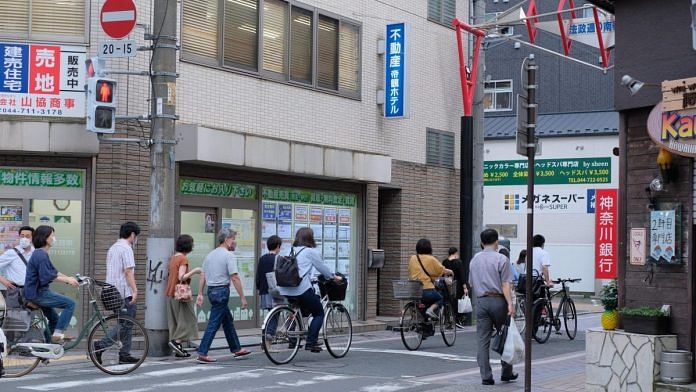Tokyo: Japanese Prime Minister Yoshihide Suga is set to extend a state of emergency to March 7, as he seeks to control the coronavirus, Kyodo News and other local media reported.
Suga will make the formal move Tuesday after a meeting of an advisory panel beginning at 1:30 p.m., Kyodo said, citing an unnamed source close to the matter. The extension comes as recorded Covid-19 infections have fallen from peaks hit in early January, when the month-long measure was first imposed, but not enough to warrant an end to the emergency that was due to finish Feb. 7.
“The number of infected people is falling but I think caution is still needed for a while,” Suga told reporters Monday evening. The prime minister will hold a news conference at 7:40 p.m. Tuesday to discuss the virus.
The current emergency measure has been in effect for 11 areas, including Tokyo and Osaka, that account for about 60% of the economy’s total output. It calls for residents to avoid going out after 8:00 p.m., while bars and restaurants have been asked to voluntarily close at that time.
The extension will remain for 10 areas and be lifted for Tochigi prefecture, north of Tokyo, where infections have fallen sharply from the start of January, Kyodo said.
Japan’s lower house of parliament passed two bills imposing penalties on those who fail to obey official coronavirus virus management orders, adding teeth to the current voluntary guidelines. The legislation was expected to gain final approval later this week in the upper house, which is also controlled by Suga’s ruling coalition.
The measures come as Suga tries to reverse a slip in support among a public critical of his virus policies ahead of an election that must be held by October. With the vaccine roll out not set to start in Japan until the end of the month, restrictions on activities remain his main tool for controlling the spread of infections.
Under the revised special measures act, businesses can be fined up to 300,000 yen ($2,870) if they don’t comply with official orders to shorten their operating hours. A separate act on controlling infectious diseases would allow fines of as much as 500,000 yen on those with Covid-19 who refuse to be hospitalized.
It was unclear when the new legislation will come into effect.
While more media attention has been focused on the difficulty of finding vacant hospital beds amid infections that hit record highs in early January, there have been some instances of individuals refusing to enter a hospital. A survey by the western prefecture of Nara found 29 such cases over the past year, with people citing reasons such as “having a pet that can’t be left alone” or “having things to do at work,” the Mainichi newspaper said.
The extension of the emergency will put more pressure on the economy. The two-month emergency is likely to slice around 3 trillion yen ($28.6 billion) off gross domestic product, according to Toshihiro Nagahama, economist at Dai-Ichi Life Research Institute.
As of Jan. 29, economists expected the economy to shrink by an annualized 2.5% this quarter having previously forecast an expansion, though some analysts see a much bigger hit. Economists at SMBC Nikko Securities Inc. now see a stronger finish to 2020 morphing into an 11.5% contraction in the three months through March.
The government is seeking to bring infections down to Stage 3 of four levels before lifting the emergency. That would mean numbers in Tokyo need to fall below 500 per day and the strain on hospitals must ease.
Tokyo reported 393 new infections on Monday, the first reading below 500 since Dec. 28 and well below the city’s daily record of 2,447 on Jan. 7. However, the seven-day moving average remains over 800, and the number of patients in hospitals has changed little since the emergency was declared.
The country has seen by far the fewest confirmed Covid-19 cases of any Group of Seven country, recording fewer cases in all of 2020 than the U.S. tallied on certain days in January.
Japan has yet to see the types of explosive surges that devastated medical systems in the U.S. and European countries. But with the developed world’s oldest population, Japan sits on a tinderbox, with nearly a third of its residents 65 or older. –Bloomberg
Also read: Japan discovers 3 new types of UK coronavirus strain



